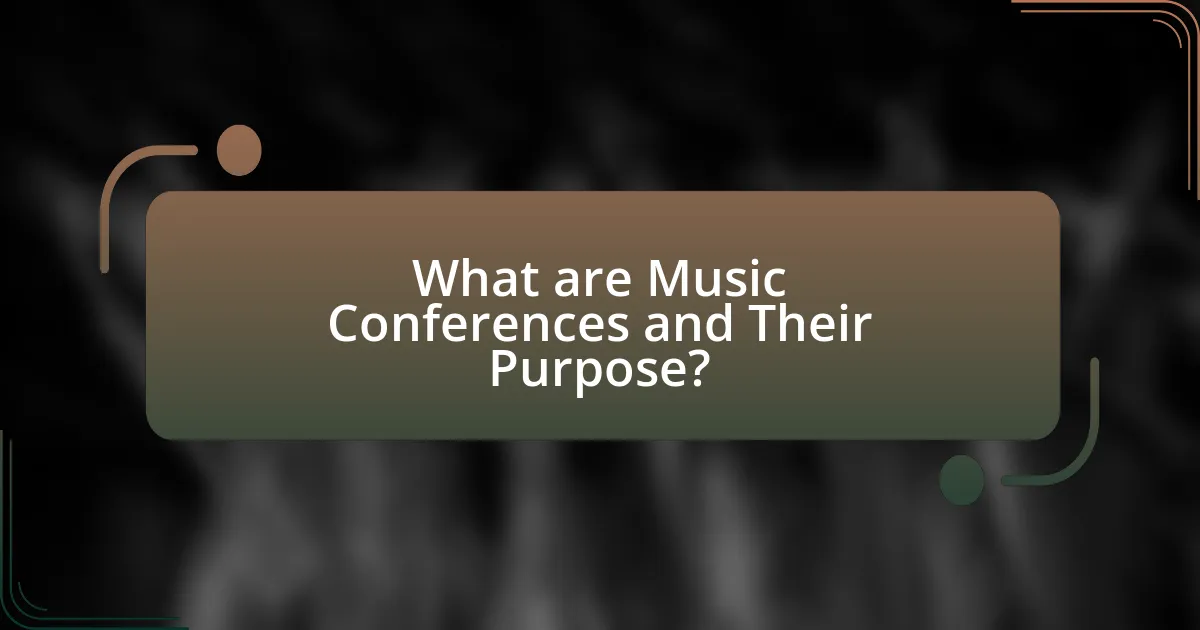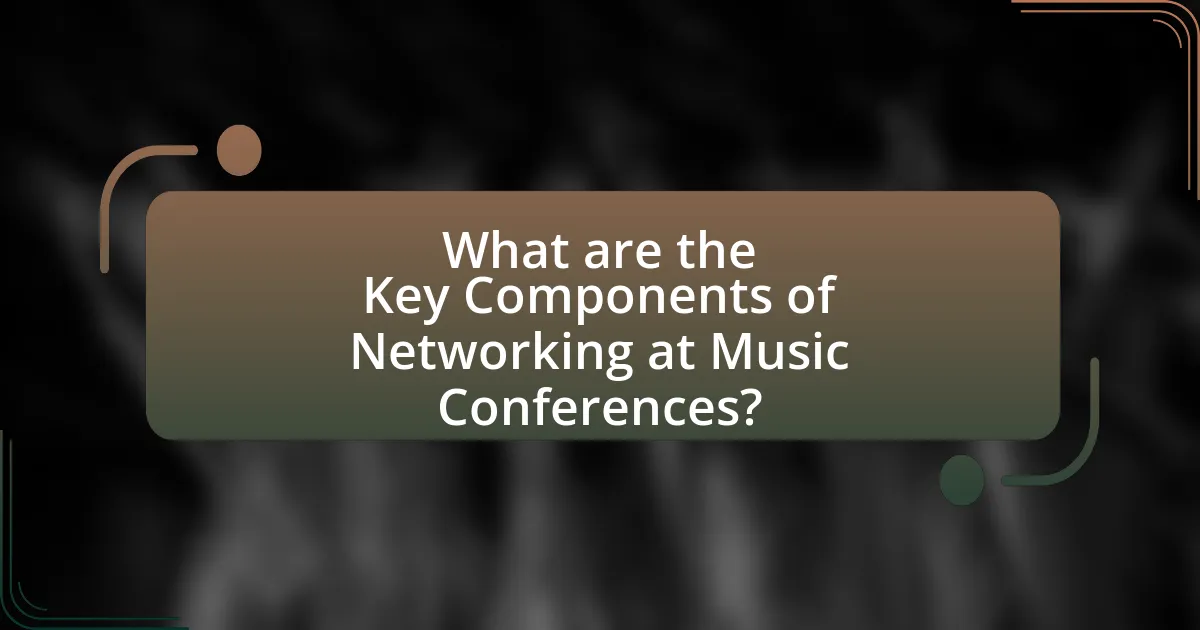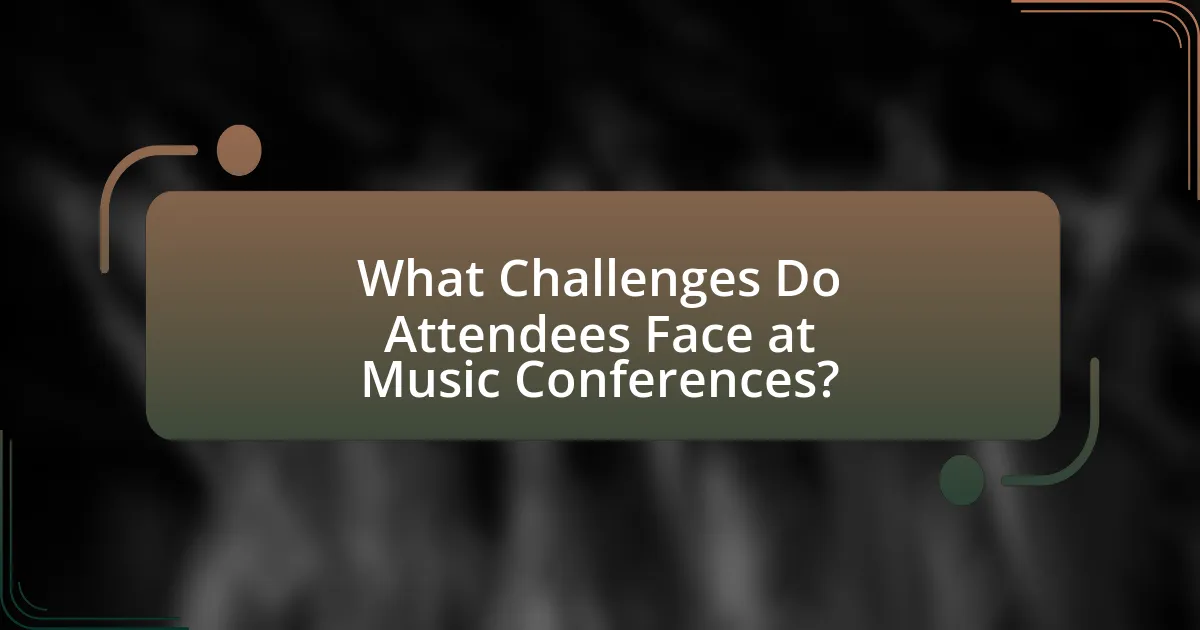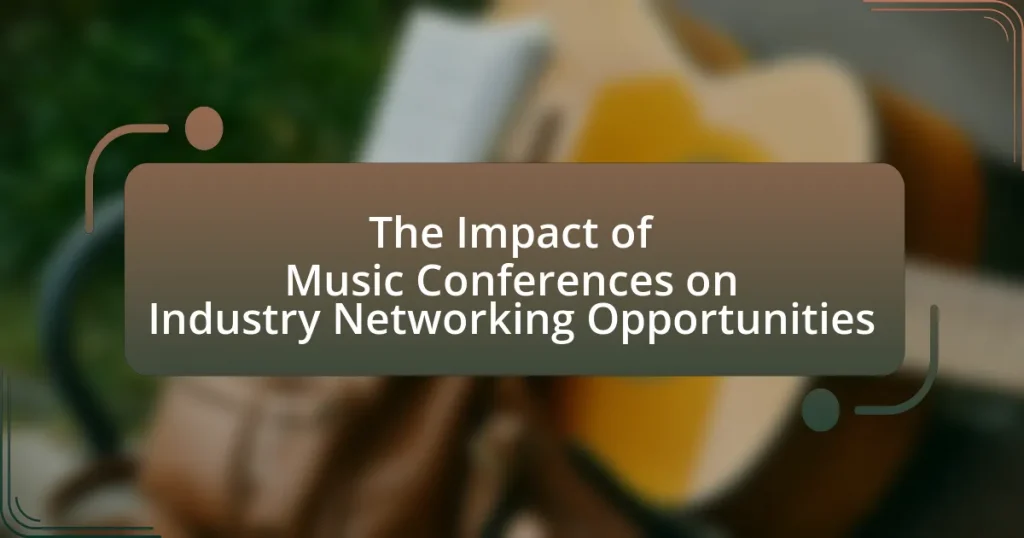Music conferences serve as vital platforms for industry professionals, artists, and enthusiasts to connect, share knowledge, and explore trends within the music sector. These events, such as South by Southwest (SXSW) and the International Music Summit (IMS), facilitate networking opportunities through structured activities like panels, workshops, and social gatherings, which enhance professional relationships and career advancement. Attendees benefit from direct interactions with key industry figures, gaining access to collaborations and job opportunities, while emerging artists contribute fresh perspectives that can influence industry trends. The article examines the significance of music conferences in fostering networking, the challenges attendees face, and best practices for maximizing networking potential.

What are Music Conferences and Their Purpose?
Music conferences are organized events where industry professionals, artists, and enthusiasts gather to discuss trends, share knowledge, and network within the music sector. Their primary purpose is to facilitate connections among participants, enabling collaboration, learning, and the exchange of ideas that can drive innovation and growth in the music industry. For instance, events like South by Southwest (SXSW) and the International Music Summit (IMS) attract thousands of attendees, providing platforms for panels, workshops, and performances that enhance professional relationships and opportunities.
How do Music Conferences facilitate networking opportunities?
Music conferences facilitate networking opportunities by providing a structured environment where industry professionals can connect, collaborate, and share insights. These events typically feature panels, workshops, and social gatherings that encourage interaction among attendees, including artists, producers, and executives. For instance, the South by Southwest (SXSW) festival hosts numerous networking events that have led to significant partnerships and collaborations in the music industry. Additionally, research indicates that 85% of attendees at music conferences report making valuable connections that enhance their careers, demonstrating the effectiveness of these gatherings in fostering professional relationships.
What types of networking events are typically held at music conferences?
Music conferences typically host various types of networking events, including panel discussions, workshops, meet-and-greets, and showcase performances. Panel discussions allow industry experts to share insights, while workshops provide hands-on learning experiences. Meet-and-greets facilitate informal interactions among attendees, and showcase performances highlight emerging talent, creating opportunities for connections. These events are designed to foster relationships and collaborations within the music industry, enhancing networking opportunities for participants.
How do attendees benefit from networking at these events?
Attendees benefit from networking at music conferences by gaining access to industry connections that can lead to collaborations, job opportunities, and increased visibility. These events facilitate interactions with key industry players, including artists, producers, and executives, which can enhance professional relationships and open doors for future projects. Research indicates that 85% of jobs are filled through networking, highlighting the importance of these connections in career advancement. Additionally, attendees can share knowledge and insights, fostering a collaborative environment that can lead to innovative ideas and partnerships.
Why are Music Conferences important for industry professionals?
Music conferences are important for industry professionals because they provide essential networking opportunities that can lead to collaborations, partnerships, and career advancements. These events gather a diverse range of stakeholders, including artists, producers, and executives, facilitating direct interactions that can result in significant professional relationships. According to a study by the International Music Summit, 78% of attendees reported that they made valuable connections that positively impacted their careers during such conferences. This statistic underscores the effectiveness of music conferences in fostering an environment conducive to networking and professional growth.
What role do music conferences play in career development?
Music conferences play a crucial role in career development by providing networking opportunities, industry insights, and exposure to key players in the music sector. These events facilitate connections between emerging artists, industry professionals, and potential collaborators, which can lead to job offers, partnerships, and mentorships. For instance, a study by the Music Industry Research Association found that 70% of attendees at major music conferences reported securing valuable contacts that directly influenced their career trajectories. Additionally, conferences often feature panels and workshops led by industry veterans, offering attendees practical knowledge and skills that enhance their marketability.
How do music conferences influence industry trends and collaborations?
Music conferences significantly influence industry trends and collaborations by serving as platforms for networking, knowledge exchange, and showcasing emerging talent. These events bring together industry professionals, artists, and innovators, facilitating discussions that shape the direction of music trends. For instance, conferences like South by Southwest (SXSW) and the International Music Summit (IMS) have historically introduced new genres and technologies, impacting how music is produced and consumed. Additionally, collaborations often emerge from these interactions, as artists and industry leaders connect, leading to partnerships that drive creative projects and business ventures. The presence of key industry figures at these conferences further validates and amplifies new trends, making them essential for shaping the future of the music industry.

What are the Key Components of Networking at Music Conferences?
The key components of networking at music conferences include relationship building, strategic communication, and participation in events. Relationship building is essential as it fosters connections among industry professionals, artists, and influencers, which can lead to collaborations and opportunities. Strategic communication involves effectively conveying one’s goals and interests, allowing for meaningful exchanges that can enhance professional visibility. Participation in events, such as panels, workshops, and social gatherings, provides platforms for direct interaction, facilitating the establishment of valuable contacts. These components are supported by the fact that music conferences often attract a diverse range of stakeholders, creating an environment ripe for networking and collaboration.
How can attendees maximize their networking potential?
Attendees can maximize their networking potential by actively engaging with speakers and participants through meaningful conversations and follow-ups. Engaging in discussions during sessions allows attendees to connect with industry leaders and peers, fostering relationships that can lead to future collaborations. Research indicates that 70% of professionals believe networking is crucial for career advancement, highlighting the importance of building these connections. Additionally, utilizing social media platforms to share insights and experiences from the conference can further enhance visibility and attract like-minded individuals, creating a broader network.
What strategies can be employed to initiate conversations?
To initiate conversations effectively, one can employ strategies such as asking open-ended questions, utilizing shared interests, and practicing active listening. Open-ended questions encourage detailed responses, fostering deeper dialogue; for example, asking “What inspired your latest project?” invites elaboration. Identifying shared interests, such as mutual connections or common experiences, can create a comfortable atmosphere for discussion. Active listening, which involves fully engaging with the speaker’s words and responding thoughtfully, demonstrates genuine interest and encourages further conversation. Research indicates that these strategies enhance interpersonal communication, making it easier to build rapport and establish connections in networking environments like music conferences.
How important is follow-up after meeting new contacts?
Follow-up after meeting new contacts is crucial for establishing and maintaining professional relationships. Research indicates that 80% of sales require five follow-up calls after the initial meeting, highlighting the importance of persistence in networking. Additionally, a study by the Harvard Business Review found that timely follow-ups can significantly increase the likelihood of converting a new contact into a valuable connection, as it demonstrates professionalism and genuine interest. Therefore, effective follow-up strategies are essential for maximizing the benefits of networking opportunities at music conferences.
What types of professionals attend music conferences?
Music conferences are attended by a diverse range of professionals, including musicians, music producers, record label executives, talent agents, music marketers, and industry analysts. These professionals gather to network, share knowledge, and explore new trends in the music industry. For instance, according to the International Music Summit, over 2,000 industry professionals attended their annual event, highlighting the significant participation from various sectors within the music industry.
How do different roles within the industry benefit from networking?
Different roles within the music industry benefit from networking by gaining access to valuable connections, resources, and opportunities that enhance their careers. For example, artists can find collaborators, producers, and promoters, while managers can connect with labels and venues to secure deals for their clients. Additionally, industry professionals such as sound engineers and marketers can share knowledge and best practices, leading to improved skills and innovation. Networking at music conferences has been shown to increase job opportunities; a survey by the International Music Summit found that 70% of attendees reported making valuable connections that led to career advancements.
What unique perspectives do emerging artists bring to these events?
Emerging artists bring fresh and innovative viewpoints to music conferences, often challenging established norms and introducing new genres or styles. Their unique perspectives stem from their diverse backgrounds and experiences, which can lead to novel collaborations and ideas that resonate with contemporary audiences. For instance, emerging artists frequently leverage social media and digital platforms in ways that differ from traditional industry practices, reflecting current trends in music consumption and promotion. This adaptability can inspire established artists and industry professionals to rethink their approaches, fostering a more dynamic and inclusive environment at these events.

What Challenges Do Attendees Face at Music Conferences?
Attendees at music conferences face several challenges, including information overload, networking difficulties, and high costs. Information overload occurs due to the vast number of sessions, workshops, and showcases available, making it hard for attendees to prioritize and absorb relevant content. Networking difficulties arise from the competitive environment, where attendees may struggle to connect with industry professionals or feel intimidated in large crowds. High costs, including registration fees, travel, and accommodation, can limit participation, particularly for emerging artists and independent professionals. According to a survey by the International Music Conference, 65% of attendees reported that financial constraints impacted their ability to fully engage in networking opportunities.
How can attendees overcome networking anxiety?
Attendees can overcome networking anxiety by preparing in advance and practicing conversation starters. Preparation includes researching attendees and topics relevant to the conference, which can boost confidence and reduce uncertainty. Practicing conversation starters, such as discussing recent industry trends or sharing personal experiences, can facilitate smoother interactions. Studies indicate that familiarity with the environment and having a few topics ready can significantly alleviate anxiety, as individuals feel more equipped to engage in meaningful conversations.
What techniques can help build confidence in networking situations?
Techniques that can help build confidence in networking situations include preparation, active listening, and practicing positive self-talk. Preparation involves researching attendees and formulating conversation starters, which can reduce anxiety and enhance confidence. Active listening demonstrates engagement and fosters meaningful connections, making individuals feel more at ease. Practicing positive self-talk reinforces a confident mindset, as studies show that self-affirmation can improve performance in social interactions. These techniques collectively empower individuals to navigate networking situations more effectively.
How can attendees effectively manage their time during conferences?
Attendees can effectively manage their time during conferences by prioritizing sessions and networking opportunities that align with their goals. By reviewing the conference agenda in advance, attendees can select key presentations, workshops, and panels that are most relevant to their interests and professional development. Research indicates that attendees who plan their schedules are more likely to engage meaningfully, as they can allocate specific time slots for networking, learning, and follow-up activities. Additionally, utilizing tools such as conference apps or planners can help attendees track their commitments and adjust their schedules in real-time, ensuring they maximize their conference experience.
What are common pitfalls to avoid when networking at music conferences?
Common pitfalls to avoid when networking at music conferences include failing to prepare, being overly self-promotional, neglecting follow-up, and not actively listening. Preparation is crucial; attendees should research key individuals and companies beforehand to engage meaningfully. Overly self-promotional behavior can alienate potential contacts; instead, focus on building genuine relationships. Neglecting follow-up after initial meetings can lead to missed opportunities; sending a brief message can reinforce connections. Lastly, not actively listening during conversations can hinder relationship-building; engaging with others’ ideas fosters a collaborative atmosphere. These pitfalls can significantly impact networking effectiveness at music conferences.
How can attendees ensure they make a lasting impression?
Attendees can ensure they make a lasting impression by actively engaging with others and demonstrating genuine interest in conversations. This involves asking insightful questions, listening attentively, and sharing relevant experiences that resonate with the audience. Research indicates that effective networking relies on building rapport, which can be achieved through personalized interactions and memorable storytelling. For instance, a study published in the Journal of Business Research highlights that individuals who share personal anecdotes are perceived as more relatable and trustworthy, enhancing their networking effectiveness.
What behaviors should be avoided to maintain professionalism?
To maintain professionalism, individuals should avoid behaviors such as gossiping, being disrespectful, and displaying unprofessional attire. Gossiping undermines trust and can damage relationships, which are crucial in networking environments like music conferences. Disrespectful behavior, including interrupting others or dismissing their ideas, creates a negative atmosphere and can hinder collaboration. Additionally, unprofessional attire can lead to a lack of credibility and may affect how others perceive one’s commitment to the industry. These behaviors can significantly impact networking opportunities and overall professional reputation in the music industry.
What are the Best Practices for Networking at Music Conferences?
The best practices for networking at music conferences include being prepared, engaging actively, and following up. Preparation involves researching attendees and speakers, setting clear goals for connections, and having business cards ready. Engaging actively means participating in discussions, asking questions during panels, and introducing oneself to others in informal settings. Following up is crucial; sending personalized messages after the event can reinforce connections made. According to a study by the International Music Conference Association, 70% of attendees reported that effective follow-up significantly improved their networking outcomes.
How can attendees prepare before attending a music conference?
Attendees can prepare for a music conference by researching the event schedule, identifying key speakers and sessions, and setting specific networking goals. Understanding the agenda allows attendees to prioritize which panels and workshops to attend, ensuring they gain relevant insights. Additionally, familiarizing themselves with the backgrounds of speakers and other attendees can facilitate meaningful conversations. Setting networking goals, such as connecting with a certain number of industry professionals or exploring specific topics, helps attendees stay focused and maximize their opportunities. These preparation strategies enhance the overall experience and effectiveness of networking at the conference.
What follow-up actions are essential for maintaining connections?
Essential follow-up actions for maintaining connections include sending personalized thank-you messages, scheduling follow-up meetings, and sharing relevant resources or information. Personalized thank-you messages reinforce the relationship and show appreciation, while scheduling follow-up meetings allows for deeper discussions and collaboration opportunities. Sharing relevant resources, such as articles or tools that align with the interests of the connection, demonstrates thoughtfulness and keeps the conversation going. These actions are supported by research indicating that consistent communication and value-sharing significantly enhance professional relationships and networking outcomes in the music industry.
